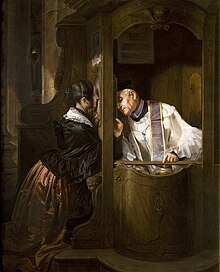Our website is made possible by displaying online advertisements to our visitors.
Please consider supporting us by disabling your ad blocker.
Absolution

Absolution is a theological term for the forgiveness imparted by ordained Christian priests and experienced by Christian penitents. It is a universal feature of the historic churches of Christendom, although the theology and the practice of absolution vary between Christian denominations.
Some Christian traditions see absolution as a sacrament—the Sacrament of Penance. This concept is found in the Catholic Church, Eastern Orthodox Church, Oriental Orthodox Churches, Assyrian Church of the East and the Lutheran Church.[1][2] In other traditions, including the Anglican Communion and Methodism, absolution is seen as part of the life of the church, with the Thirty-nine Articles and Twenty-five Articles respectively counting absolution amongst the five rites described as "Commonly called Sacraments, but not to be counted for Sacraments of the Gospel". Confession and Absolution is practiced in the Irvingian Churches, though it is not a sacrament.
In the Reformed tradition (which includes the Continental Reformed, Presbyterian and Congregationalist denominations), corporate confession is the normative way that this rite is practiced.[3]
- ^ Haffner, Paul (1999). The Sacramental Mystery. Gracewing Publishing. p. 11. ISBN 9780852444764.
The Augsburg Confession drawn up by Melanchton, one of Luther's disciples admitted only three sacraments, Baptism, Communion, and Penance. Melanchton left the way open for the other five sacred signs to be considered as "secondary sacraments". However, Zwingli, Calvin and most of the later Reformed tradition accepted only Baptism and the Lord's Supper as sacraments, but in a highly symbolic sense.
- ^ Smith, Preserved (1911). The Life and Letters of Martin Luther. Houghton Mifflin. p. 89.
In the first place I deny that the sacraments are seven in number, and assert that there are only three, baptism, penance, and the Lord's Supper, and that all these three have been bound by the Roman Curia in a miserable captivity and that the Church has been deprived of all her freedom.
- ^ "Order of Worship". Grace Reformed Presbyterian Church. Retrieved 23 September 2024.
Each Sunday we have a corporate confession of sins with an announcement of assurance of pardon from sin—this is great news for all believers. We strive to use the form of confession sincerely, to acknowledging our brokenness—in thought, word, and deed—and to receive God's forgiveness through Jesus Christ in thankfulness.
Previous Page Next Page


